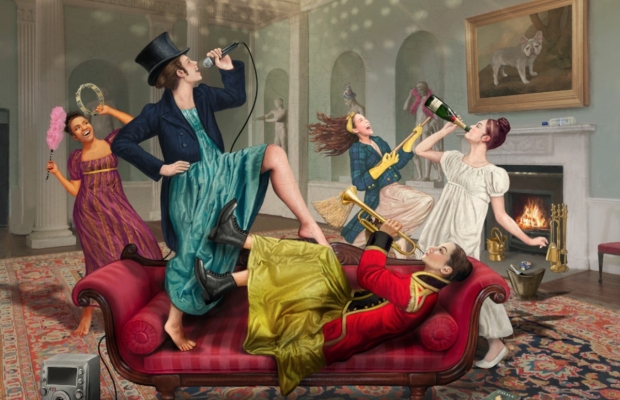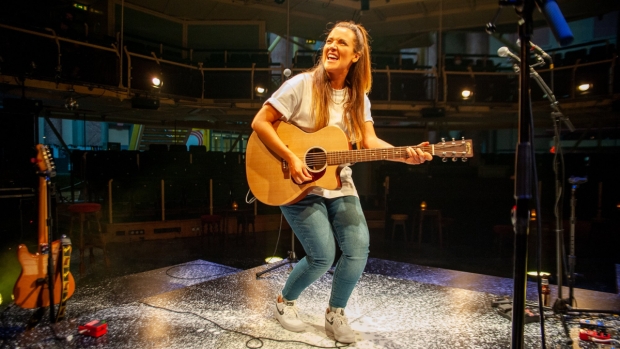Dominic Cavendish is wrong when he says there are too many musicals in the UK
We thought we’d give our two cents

© Left: Steve Gregson, right: Marc Brenner
If there's one way to incense the musical theatre community, it's to trot out the question: "does Britain really need so many musicals?" – as was done yesterday in a Telegraph piece yesterday.
Running through the tentpole productions in London and a select few on tour right now, journalist Dominic Cavendish states that "Britain looks like it's drowning in musicals" – asking whether or not "almost every new or returning production has to be a musical?"
To kick off with a more positive tone, Cavendish highlights some important points: namely that it's nice to see large-scale musical productions employ such a vast number of professionals after the perilous past 18 months. He also hits the nail on the head when it comes to Hollywood struggling to make successful movies from big hits like Dear Evan Hansen, which is floundering at the box office in the US.
But there are two key problems with his assertion about the volume of musicals on stages: firstly he misrepresents the musical form, and secondly, he's selected an oddly blinkered sample size.
To the former. From his standfirst onwards, Cavendish seems to suggest that "serious plays" and "musicals" as axiomatically different, or as he puts it, the former presents "subtext not amplified sentiments, subtle dramatic action not dance-steps, reflection at the end of scenes", whereas the latter is apparently guilty of the amplification and dancing.
This is a clear misunderstanding of the form. A lot definitely are, but musicals aren't all jazz hands, high-kicks or cheesy plotlines: they can mean truthful, terrifying and/or groundbreaking storytelling. They can, if they want to, be "serious". What's more, the line between plays and musicals has never been less distinct: look at Girl from the North Country – about to open on Broadway after three London runs – or the whimsical take on Austen – Pride and Prejudice* (*sort of), coming to the Criterion – straddling both categories. Come From Away is basically verbatim physical theatre with some belting numbers added on top.

To the second point: Cavendish also states the West End only has a small number of "serious plays". Plus ça change – the numbers in commercial theatreland have always been tipped towards musicals. Almost all the long runners are musicals, plays have a fleeting life – that's just how consumer habits have evolved. There are or have been some, sigh, "serious" new plays on offer or coming soon: Herrin's Glass Menagerie, Fiennes' Four Quartets, Prima Facie – even the gripping ghost thriller 2:22. Oleanna reopened the Arts, Constellations was a chance to watch some serious star power and Jack Holden's blistering Cruise was one of the shows bringing the West End back to life post-Covid.
But more importantly, why narrow the parameters to the West End and not recognise the broader London theatre eco-system? The National has staged nothing but plays since its return, as have the larger producing houses including the Almeida, Lyric Hammersmith, the Hampstead and Theatre Royal Stratford East. That's before we even look at the cutting edge off-West End venues such as Theatre503 or the Bush, or the wealth of work being produced outside the capital – which Cavendish doesn't even nod to.
If he's on the hunt for "serious" musicals that don't "press similar buttons" or that are "more diverting than thought-provoking", then the critic should look further afield. Tokyo Rose at Southwark Playhouse sees an Asian-American having her identity torn apart – that feels "thought-provoking" given the events of the last 18 months and the intense hatred levelled at BESEA communities. Paines Plough's Black Love is a glorious touring production from Chinonyerem Odimba (on til 17 October), while Lauryn Redding's one-woman Bloody Elle was similarly charged when it premiered at the Royal Exchange. Islander, created by Amy Draper, Stewart Melton and Finn Anderson, blended loop pedal tech with Scottish folk – tell me that is simply "diverting". It's now been (successfully) adapted into a film by Dundee Rep and Eden Court Theatre.

© Pippa Rankin
It's attitudes touted by articles like this that stymie the development of new musicals and the disruption of the hegemony of the West End: pigeonholing what is a malleable, dextrous medium as being nothing but crowd-pleasing candy. If audiences don't understand that musicals can offer more than what Cavendish describes as "amplified sentiments", then they'll always expect the same fare and not seek out the new work – work rewriting the rulebook.
There are brilliant initiatives from producers like Adam Lenson (who Cavendish refers to in his piece) and Katy Lipson that drive the label of "musical" onwards. The pair are staging a West End showcase of new work that is in its infancy, created by up-and-coming creators. I encourage Cavendish to go along and attend on 4 October to see what musicals can achieve – he (and you) can get tickets here.













